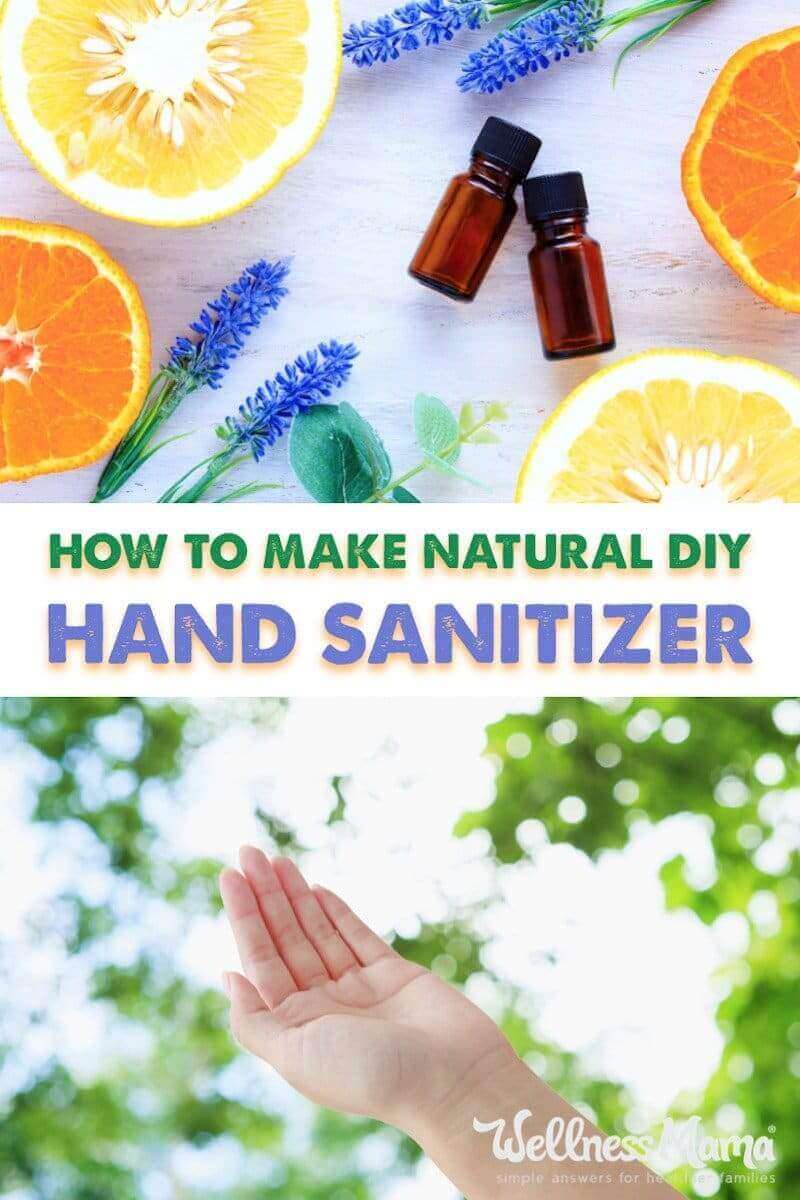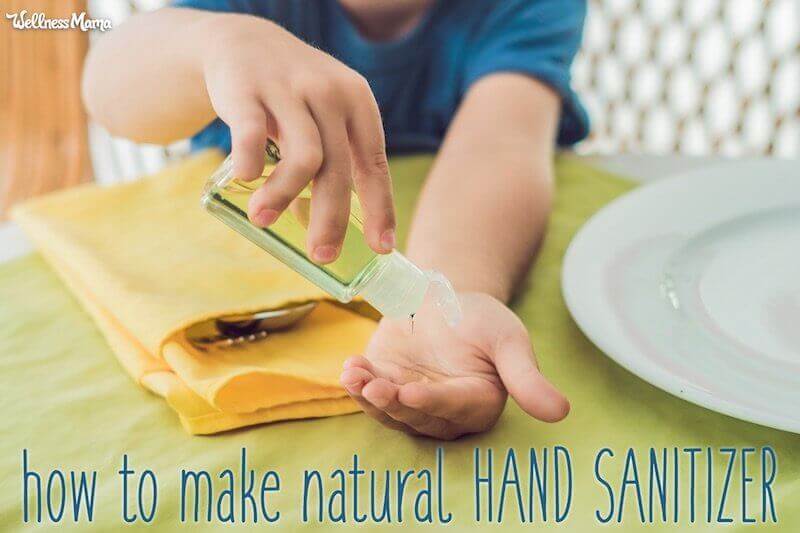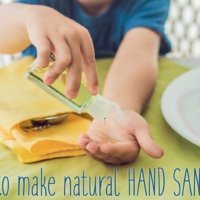I am not a fan of commercial hand sanitizers. (Probably doesn’t surprise anyone!) This may sound strange but I don’t use antibacterial soap or strong cleaners at home because I actually believe having a little bacteria around is a good thing.
I’m glad that I started making my own personal care products years ago, especially since the FDA ruled in 2016 that manufacturers should stop using triclosan, a common ingredient in antibacterial soaps and sanitizers at the time, due to its ability to disrupt hormones and contribution to a rise in resistant strains of bacteria.
Just goes to show it pays to read the research!
That said… certain ingredients can be helpful in combating viruses, and with the current climate of those going around, I am being more proactive than I normally am. Scroll down to the bottom of this post to see other measures I’m taking to stay well.
Why Put Down the Hand Sanitizer?
My home isn’t a hospital (thanks to generally strong immune systems) so I take a gentler approach and make this homemade hand sanitizer to use only when we can’t wash our hands or are concerned about exposure to really bad bacteria.
I can see the appeal of killing “99.9% of germs” when you have a family of small children, and illness for one usually means illness for all. Still, it’s helpful to understand some reasons why the antibacterial label popping up on all kinds of soaps, wipes, and cleaners might not be the solution it seems to be.
- Reason #1: Regular hand washing might be just as effective and should be a first line of defense. Recent reports show that washing with warm water and soap for at least 30 seconds is as effective as antibacterial soaps and sanitizers. They still have their place but make sure to wash hands as well!
- Reason #2: It may be true that antibacterial products kill 99.9% of germs, but that .1% is the most potentially harmful (since it can resist antibacterial agents). This small percentage that survives then breeds and passes on its antibiotic resistance to its offspring, creating lines of “super bugs” that resist antibiotic use. This may be one factor in the dramatic increase in strains like MRSA.
- Reason #3: Triclosan, the chemical in most antibacterial soaps has been shown to interact with chlorine in the water to form chloroform gas. On top of that, it has been shown to be a hormone disruptor, especially in children. I’m glad it’s been phased out from so many products, but I’m skeptical it solves the issue.
- Reason #4: Some evidence shows that kids who grow up in an overly sterile environment have higher rates of allergies and asthma than kids who don’t use antibacterial products as much. Exposure to different types of bacteria, especially early in life, helps kids’ immune systems to develop.
Give Bacteria a Little Respect!
My strategy when it comes to keeping the nasty bacteria at bay is to make sure my kids’ immune systems are strong. We focus on eating a real food diet with plenty of fermented veggies and drinks (good bacteria) and restricting sugar. We also prioritize good old fashioned play time outside, where they can get vitamin D from the sun and healthy bacteria from the soil microbiome.
I use handmade bar soaps or homemade foaming hand soap for all of our hand washing needs, and we made it through another flu season with no cases of the flu. Coincidence? Maybe, but I don’t see the need to use harsh chemicals to sanitize my house daily.
Benefits of Natural Hand Sanitizer (with Essential Oils)
We don’t use even our natural hand sanitizer very often and opt for simple hand washing whenever possible. I do keep a little bottle of homemade hand sanitizer by the sink though to ensure safety after handling meat or changing a diaper, etc.
Besides stinking to high heaven, commercial sanitizers often contain drying alcohol that is too strong for kids to use anyway. The nice thing about making my own is I can make a more gentle version for use around the kids and a stronger one to use in a place like a public restroom.
Instead of triclosan or other antibacterial agents, I use essential oils that inhibit bacteria naturally, being careful to choose ones that are safe for kids. There is also some evidence that these oils can help battle viruses, making them potentially more effective. It is important to note that these first two recipes are more like a waterless soap and not a full hand sanitizer. The CDC explains that a product must be at least 60% alcohol to be a hand sanitizer and only the last recipe can reach that percentage.
How to Make Your Own Natural Hand Sanitizer
Here are my go-to hand sanitizer recipes. I start out with the most gentle. Increase the strength as needed.
Homemade Hand Sanitizer Recipe (Safe for Kids)
Materials
- ¼ cup aloe vera gel
- 20 drops germ destroyer essential oil
Instructions
- Mix all ingredients and store in a reusable silicone tube.
- Use as needed to naturally remove germs from hands.
Notes
Stronger Hand Sanitizer Recipe
For a stronger hand sanitizer that performs like commercial versions (without the triclosan), try this recipe. If you work in a hospital, this might be a good one for your personal use. I would not use this recipe on kids!
Ingredients
- 1 TBSP rubbing alcohol
- 1/2 tsp vegetable glycerin (optional)
- 1/4 cup aloe vera gel
- 20 drops Germ Destroyer oil
- 1 TBSP distilled water or colloidal silver/ionic silver for extra antibacterial power
- other essential oils (just for scent)
Instructions
- To make, mix aloe vera gel, optional glycerin, and rubbing alcohol in a small bowl.
- Add cinnamon essential oil and tea tree oil along with a drop or two of any other oils you want to add for scent. Lemongrass, orange, lavender, and peppermint are good choices.
- Mix well and add about 1 tablespoon of distilled water (or colloidal/ionic silver) to thin to desired consistency.
- Use a small funnel or medicine dropper to transfer hand sanitizer into spray or pump type bottles. This can also be stored in small silicone tubes for use on the go.
- Use as you would any other type of hand sanitizer.
Strongest Homemade Hand Sanitizer Recipe (5 Minute Recipe)
The CDC recommends at least 60% alcohol in hand sanitizer to effectively battle viruses. This formula follows this percentage and adds aloe vera for gentleness and essential oils for extra virus fighting. This is the one I am currently using after being in areas where viruses are more likely to be transmitted.
Ingredients:
- 2/3 cup rubbing alcohol (70% or higher)
- 2 Tablespoons aloe vera (If unable to find aloe vera, glycerin can be used as a substitute)
- 20 drops Germ Destroyer Essential Oil. (You can also use Germ Fighter which is stronger but I wouldn’t recommend for use on kids)
Instructions:
- Mix all ingredients and combine in a spray bottle (these are the perfect size) or small bottle of any kind. Use as needed.
Keep in mind that you should adjust the recipe depending on the strength of the alcohol you’re using. For example, if you’re using 99% Isopropyl rubbing alcohol, you’ll need a different amount of aloe vera than if you were using 70% alcohol. Here are some quick guidelines?
Option 1 with 99% Isopropyl Rubbing Alcohol:
2 parts alcohol
1 part aloe vera gel
(For example: 2/3 cup alcohol + 1/3 cup aloe vera gel)
Option 2 with 70% Isopropyl or Rubbing Alcohol:
9 parts alcohol
1 part aloe vera gel
(For example: 90ml or 3 ounces of alcohol + 10ml or 2 teaspoons of aloe vera gel)
Option 3 with 91% Isopropyl or Rubbing Alcohol:
3 parts alcohol
1 part aloe vera gel
(For example: 3/4 cup alcohol + 1/4 cup aloe vera gel)
Notes
- Always check with a doctor or healthcare provider before using essential oils, especially on children or if you have a medical condition.
- Using fresh aloe vera gel isn’t as stable for counter storage; a commercial brand is recommended.
If you like this recipe, also try my DIY disinfecting wipes for kitchen counters or bathrooms.
Other Ways We Stay Well
This time of year, we prioritize a few ways to stay well:
- Diffusing Essential Oils: I’m diffusing Germ Destroyer Kid-Safe essential oil or Germ Fighter Essential Oil (from Plant Therapy) regularly. I’m also keeping many of their blends including Respiraid on hand in case of illness.
- Hand Washing: Sources agree that regular hand washing with soap and warm water for at least 30 seconds is just as effective as harsh sanitizers so we’re making sure to wash our hands even more than we normally would, especially after being in any public places.
- Nasal Irrigation: Another step I always take this time of year. We use a mixture of XClear nasal rinse with Xylitol and Nasopure Nasal Irrigation, especially after travel or potential exposure.
- Propolis Spray: We spray our throats with Propolis spray before and after leaving the house.
- Vitamin C: Several sources recommend getting enough Vitamin C to help fortify the body against viruses. I keep ascorbic acid powder on hand and increase our dose at the first sign of any sniffles. I also get Vitamin C IVs this time of year, especially before and after travel.
- Vitamin D: Sources also suggest that having optimal Vitamin D levels might help protect the body from the worst of viruses and from respiratory complications. I test our levels this time of year (EverlyWell has an at-home test) and use drops to get our levels in a good range (above 50).
This article was medically reviewed by Dr. Lauren Jefferis, board certified in Internal Medicine and Pediatrics. As always, this is not personal medical advice and we recommend that you talk with your doctor or work with a concierge doctor at SteadyMD.
Ever made your own hand sanitizer? How did it turn out?






Leave a Reply